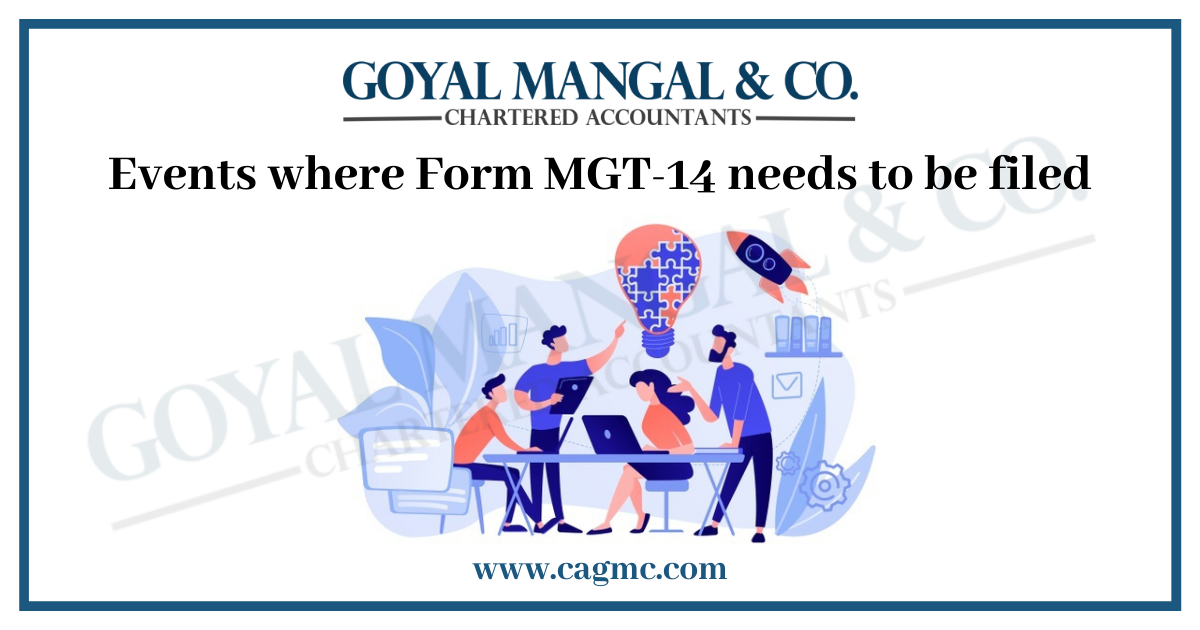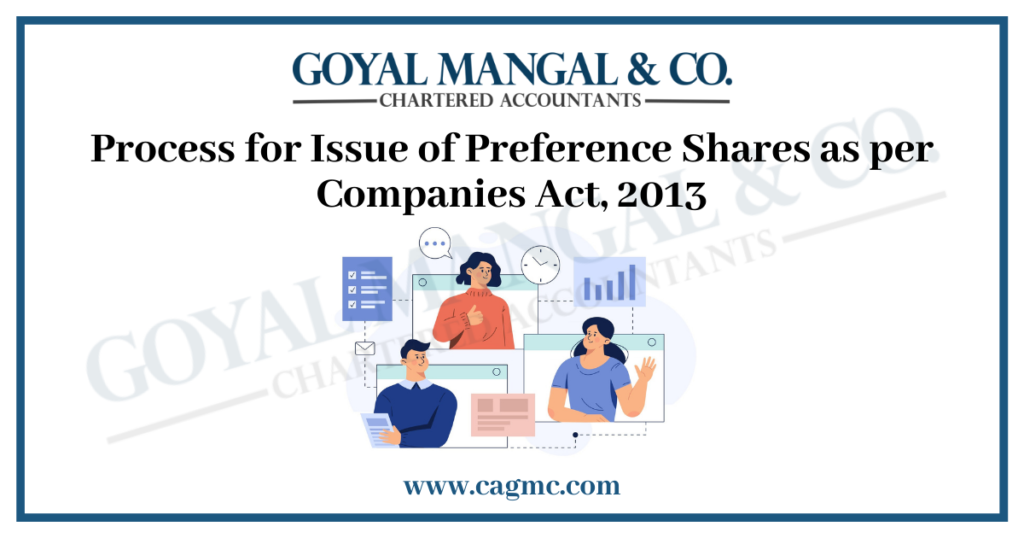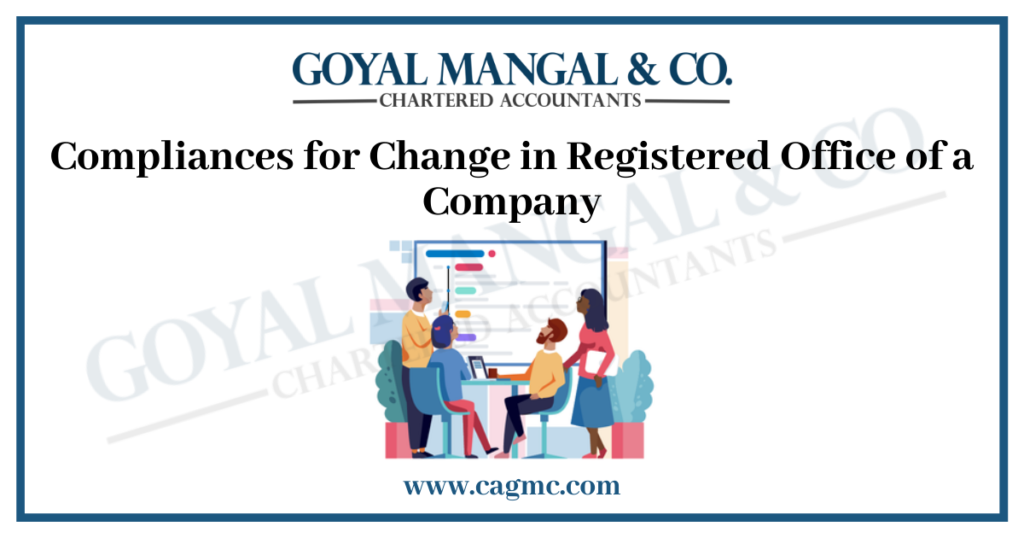
Form MGT 14 was presented in the Companies Act of 2013 with the objective of documenting specific goals with the Registrar of Companies. Such resolutions should be filed after the death of the equivalent at the meeting held by the Board/Shareholders/Creditors of the company. This article takes a gander at the resolutions to be filed in Form MGT 14.
| Table of Contents |
What is Form MGT-14?
In compliance with the provisions of Section 94(1) and 117(1), of the Companies Act, an company is needed to file with the Registrar of Companies (ROC), the form MGT-14. However, this does exclude Private Companies and they are along these lines not needed to file form MGT-14 according to the Companies Act. Furthermore, they need not record something very similar for issues that are determined under section 179(3) of the Companies Act read with Rule 8 of the Companies (Meetings of Board and its Powers) Rules 2014.
According to Section 117(1), the company will file the resolutions and provisions in form MGT-14 within 30 days from the resolution being passed. Presently, by the Amendment Act, 2017 provision of 270 extra days was eliminated from the New Act. Before 07 May 2018 Companies was needed to file e-form MGT-14 inside 30 days of passing of resolution and on the off chance that neglects to record inside 30 days, in next 270 days with additional fees.
Why is Form MGT-14 filed?
A company when they hold a Board of Directors or Shareholders or the Creditors meeting, they pass resolutions and this ought to be filed with the ROC by the company or outlet as appropriate. What’s more for this, they will adopt Form MGT-14.
It is just with respect to Section 179(3) and Rule 8 of amended Companies (Meetings of Board and its Powers) Rules, 2014. Consequently, any activity referenced under Section 117(3) of the CA 2013 (i.e., 117(3) (a) to (f) of the CA 2013), Private Companies actually need to file form MGT-14 with ROC.
Resolutions/Agreements to be filed under Section 117 (3)
- Special Resolutions.
- Resolutions which have been agreed to be passed as special resolutions by all the members of the company.
- Any resolution passed by the BOD with regard to appointment/reappointment/renewal/variation of the terms of appointment of the managing director.
- Resolutions that have been agreed to be passed by a specified majority or in a particular manner by any class of members.
- Resolutions requiring winding up of the company as specified under section 59 of the Insolvency and Bankruptcy Code 2016.
- Resolutions passed under Section 179(3).
List of Resolutions to be filed in Form MGT-14
List of resolutions to be filed by Form MGT-14 can be divided into 3 parts:
Annexure A- Board Resolutions:
Under Annexure A, the following matters dealt with in the board resolutions needs to filed:
- Inspection of the books of accounts as well as the other records of the subsidiary.
- Authorisation for making political contributions.
- Making an investment or giving of loan/guarantee/security by the company.
- Related party transaction contract/agreement.
- Appointment of a whole-time key managerial personnel of a company.
- Appointment of a person as managing director if he is the manager/managing director of another company.
- Approval of self prospectus.
- Appointing/ re-appointing/renewing of appointment/variation of the terms of appointment, of a managing director.
- Calling of the unpaid amount on the shares from the shareholders.
- Authorisation of buy-back of securities as provided under Section 68.
- Issuing securities (including debentures) in India/outside India.
- To borrow money.
- Approval of the Board’s report and financial statements.
- To diversify the business of the company.
- To approve amalgamation, merger or reconstruction.
- Taking over a firm or acquiring the controlling stake in another firm.
Annexure B – Special Resolutions
Under Annexure B, the following matters dealt with in the special resolutions needs to filed:
- Insertion of a provision of entrenchment in Articles of Association by companies.
- Change of a registered office from one city to another in the same state.
- Alteration of Memorandum of Association.
- Change in the object in case the money raised is unutilised.
- Alteration of Articles of Association.
- Variation in terms of a contract or objects in the prospectus.
- Issue of the depository receipts in any of the foreign countries.
- Variation of shareholder rights.
- Issue of sweat equity shares.
- Issue of employee stock options.
- A private offer of securities.
- Issue of debentures or loans containing an option for conversion to shares.
- Reduction of share capital.
- Purchase/subscription of fully paid shares for the benefit of employees.
- Buyback of shares.
- Keeping registers at any other place in India other than the registered office.
- Removal of auditor before the expiry of the term.
- Appointment of more than 15 directors.
- Reappointment of Independent Director.
- Restricting the number of directorships of a director.
- Selling, leasing or otherwise disposing of the whole/substantially the whole of the undertaking of the company or in case the company owns more than one undertaking, of the whole or substantially the whole of any of such undertakings.
- Investing otherwise in trust securities, the amount of compensation obtained by it as a result of an amalgamation or merger.
- Borrowing money, where the money to be borrowed plus the money already borrowed by the company will exceed the aggregate of its paid-up share capital plus free reserves, other than the temporary loans obtained from the company‘s bankers in the ordinary course of business.
- Provide time for the repayment of debt due from a director.
- Scheme for providing loan to directors.
- Loan and investment by a company exceeding 60% of its paid-up share capital, free reserves and securities premium account or 100% of its free reserves and securities premium account, whichever is more.
- Appointment of a director, i.e. a managing director/whole-time director/manager above the age of 70 years.
- Affairs of the company ought to be investigated.
- Application to the registrar for removal of name from the register.
- Scheme relating to the amalgamation of sick companies with any other company.
- Winding up of a company by the tribunal.
- Voluntary winding up of the company.
- To provide the liquidator with the powers to accept shares etc. as consideration for the sale of a property.
- Approval for the arrangement between the company which is about to be wound up and its creditors to be binding.
- Providing sanction to the company liquidator to exercise certain powers.
- Disposal of books and paper of the company when the company is completely wound up and is about to be dissolved.
Annexure C – Ordinary Resolutions
Under Annexure C, the following matters dealt with in the ordinary resolutions needs to filed:
- Company to change its name after receiving direction from the registrar if it has been found that the name was applied to, by furnishing false information
- Company to change its name after receiving direction from the Central Government if the name/trademark is too identical to an existing company name /registered trademark.
- Acceptance of deposits from the public.
- Representation of Corporations at the meeting of companies.
- Representation at any meeting of creditors.
- Appointing any other person other than a retiring auditor as a statutory auditor.
- Removal of director before the expiry of the period of his office.
- Delegation of the powers by the board as specified under Section 179(3) clauses (d) to (f).
- Permission to enter into non-cash transactions to a director of the company/holding/subsidiary/associate company.
- Appointment of a managing director/whole-time director/manager.
- Dissolution after considering the report of the Company Liquidator.
- Voluntary winding up of the company as a result of the expiry of the period of its duration or on the occurrence of any event in respect of which the articles provide that the company should be dissolved.
- Entering into a contract with a related party in case of companies having prescribed paid-up capital or the amount of the transaction exceeds the prescribed amount.
Penalty under Section 117 of Companies Act
If there is inability to file resolutions or Agreement according to section 117(1), inside the period determined under the Companies Act, then, at that point, the following punishment will be relevant:
- If the default is submitted by the company, a punishment of least INR 1 Lakh will be exacted, up to INR 25 Lakh. In the event that the failure continues after the first one the INR 500 for every day will be levied.
- If the default is submitted by an official, including the liquidator, the punishment pertinent will be at least INR 50,000 and a limit of INR 5 Lakh. If failure to pay continues after the first then INR 500 every day will be collected.
Time Limit to File Form MGT-14
As per Section 117(1), the company shall file the resolutions and agreements in form MGT-14 within 30 days from the resolution being passed or the agreement being entered into.
Final Words
MGT-14 should be filed by a company with the Registrar of Companies (RoC) as per Section 94(1) and 117(1) of the Companies Act 2013 and the principles made there under.


